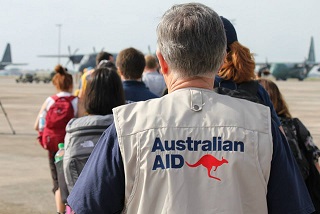Accountability and transparency of foreign aid impact
Media releaseInternational aid and development is at a crossroad and two Deakin University Warrnambool researchers are hoping to improve understanding of the impact of foreign aid.
Professor Viktor Jakupec and Dr Max Kelly say there is currently insufficient, publicly available evidence about the impact of foreign aid investment, whether positive or negative.
Their research focuses on assessing the impact of taxpayer funded foreign aid in a climate of slashed aid budgets and a lack of understanding about whether the system is working. It also looks at the rapid changes in the aid arena.
Professor Jakupec and Dr Kelly said that since the Global Financial Crisis, many governments including Australia had scaled back on foreign aid.
A core focus of many donor countries, including the Australian Department of Foreign Affairs and Trade, is now on value for money and aid for trade, they added. "The commercialisation, and financialisation of foreign aid remains a vexed question. Understanding the impact of aid under this policy on social, economic and political development is increasingly important."
"The issue is what the impact of foreign aid is, but when one looks at the major agencies, like the World Bank, International Finance Corporation and Asia Development Bank, there is little political will to make public any evidence of this impact.
Professor Jakupec and Dr Kelly said that based on their research, the agencies are often focusing on short term outputs, rather than engaging sufficiently in the impact of their projects. "Taxpayers' money is going into something but we don't know what it does, can do or will do."
Some aid agencies are using up to a 20-year framework to measure impact, "but that is questionable because in 20 years' time there will have been so many other influences. Understanding impact needs to address short, medium and long term timeframes".
Professor Jakupec and Dr Kelly said it was not possible to comment on the impact of Australia's recent aid cuts.
"We don't know the impact of the cuts to aid because we don't have sufficient evidence," he said.
Professor Jakupec and Dr Kelly have an upcoming book, Assessing the Impact of Foreign Aid, being released in November in collaboration with international scholars and practitioners analysing what the impact of foreign aid is on reducing poverty and improving living standards across the developing world.
In conjunction with limited understanding of the impact of aid, a second and parallel issue is the rapid changes in the whole aid arena. Traditional structures such as the USA-led World Bank and the Japan and USA-led Asian Development Bank, are likely to have to compete with newly formed institutions such as the Chinese-led Asian Infrastructure Investment Bank.
They said that new donors challenge existing, and perhaps inadequate, measures for demonstrating accountability of funding; meaning the question of impact becomes more acute. These two institutions will essentially be in competition and their research questions how is Australia going to benefit, or otherwise.
Share this story
 Researchers from Deakin University's Warrnambool campus are studying the impact of foreign aid. Image: DFAT Flickr
Researchers from Deakin University's Warrnambool campus are studying the impact of foreign aid. Image: DFAT Flickr
